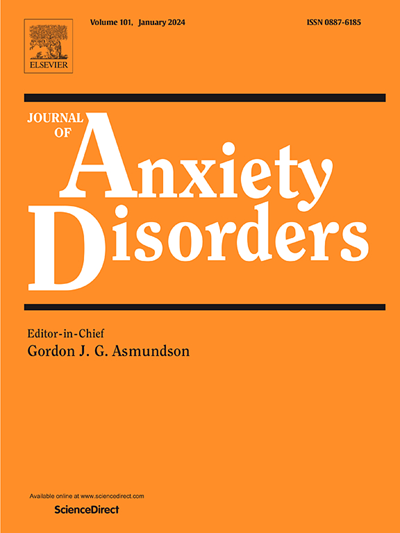恐怖吸引中的情感预测:对不确定性的不容忍的洞察
IF 4.5
2区 医学
Q1 PSYCHIATRY
引用次数: 0
摘要
在这项实地研究中,我们首次研究了不确定性不耐受如何影响对消极、积极和焦虑相关影响的预期,以及这些预期的准确性。这项研究是在一个恐怖景点进行的,它提供了一种身临其境的、不确定的、与威胁相关的体验。参与者(n = 1029)在体验之前完成了预测消极、积极和焦虑相关影响的测量。体验结束后,他们立即对每种情感状态的实际主观体验进行评分。此外,报告了每个预测情绪的信心评级,以便评估预测准确性的元认知意识。结果显示,与低IU的参与者相比,高IU的参与者预期并实际经历了更少的积极影响,更多的焦虑相关影响和更多的消极影响。IU预测了负面影响的情绪预测偏差(高估),但没有预测积极或焦虑相关的影响。研究结果表明,IU可能与情感预测有关,这对跨诊断模型和精神病理学治疗具有重要意义。本文章由计算机程序翻译,如有差异,请以英文原文为准。
Affective forecasting during a horror attraction: Insights into Intolerance of Uncertainty
In this field study, we examined for the first time how Intolerance of Uncertainty influences expectations about negative, positive, and anxiety-related affect alongside the accuracy of those expectations. The study was conducted at a horror attraction, which offers an immersive, uncertain and threat-related experience. Participants (n = 1029) completed a measure of forecasted negative, positive and anxiety-related affect prior to the experience. Immediately after the experience, they rated their actual subjective experience of each of these affective states. Additionally, confidence ratings were reported for each forecasted emotion so that metacognitive awareness of forecasting accuracy could be assessed. Results showed that participants high in IU anticipated and actually experienced less positive affect, more anxiety-related affect and more negative-affect compared to those low in IU. IU predicted bias (overestimations) in emotional forecasts for negative affect, but not for positive or anxiety-related affect. The findings demonstrate that IU may be related to affective forecasting, which has implications for transdiagnostic models and treatment of psychopathology.
求助全文
通过发布文献求助,成功后即可免费获取论文全文。
去求助
来源期刊

Journal of Anxiety Disorders
Multiple-
CiteScore
16.60
自引率
2.90%
发文量
95
期刊介绍:
The Journal of Anxiety Disorders is an interdisciplinary journal that publishes research papers on all aspects of anxiety disorders for individuals of all age groups, including children, adolescents, adults, and the elderly. Manuscripts that focus on disorders previously classified as anxiety disorders such as obsessive-compulsive disorder and posttraumatic stress disorder, as well as the new category of illness anxiety disorder, are also within the scope of the journal. The research areas of focus include traditional, behavioral, cognitive, and biological assessment; diagnosis and classification; psychosocial and psychopharmacological treatment; genetics; epidemiology; and prevention. The journal welcomes theoretical and review articles that significantly contribute to current knowledge in the field. It is abstracted and indexed in various databases such as Elsevier, BIOBASE, PubMed/Medline, PsycINFO, BIOSIS Citation Index, BRS Data, Current Contents - Social & Behavioral Sciences, Pascal Francis, Scopus, and Google Scholar.
 求助内容:
求助内容: 应助结果提醒方式:
应助结果提醒方式:


